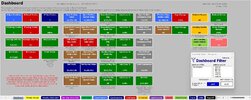I am 4th quartile for both income and assets...but I work, so you appear to be in a very favourable position Belli.
Nothing special. I prefer to live a more simple lifestyle and always have. My late wife and I didn't care what others had or wanted. It resulted in having a higher savings rate than most which went into investing for over four decades. I still invest funds but also distribute money to my children. They are going to get it eventually but I see no reason not to have some of it now.









